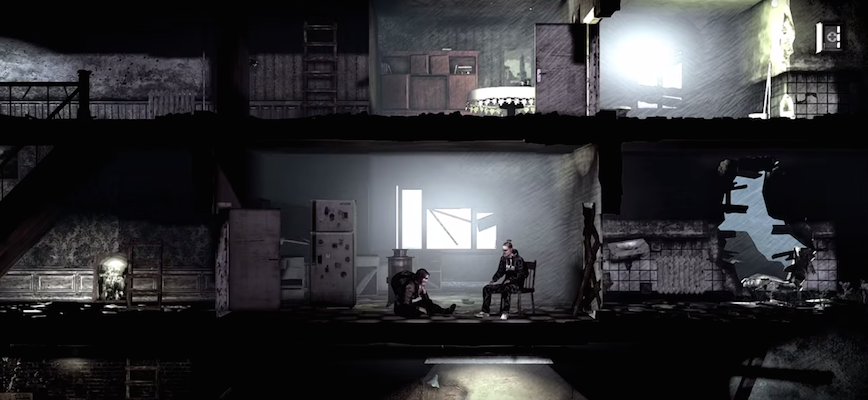New video game review: “This War of Mine”
Scavenging in the ruins of a bombed-out school, Pavle was able to locate wood, water, scrap parts, tobacco and vital medicine for his compatriots. Icy temperatures had led to an outbreak of sickness in the ruined building that Pavle and three other survivors were squatting in to avoid snipers. I had neglected to build a vital furnace in the early days of the game. Pavle’s nighttime excursions, which often meant dodging armed patrols and hostile civilians, were critical for gathering the food and supplies necessary for the daily struggle for survival in “This War of Mine.”
Released last month on Steam for Windows, Mac OS, and Linux by the Polish company 11-Bit studios, “This War of Mine” is a gritty, haunting simulation of life during the Siege of Sarajevo in the war in Bosnia. By day, you race to construct everything from armchairs to moonshine stills. By night, you must risk everything to find the supplies vital to survival. The game is reminiscent of Minecraft in both its addictiveness and the depth of its crafting system. I played for hours straight, angrily restarting when I felt I had done a poor job of gathering resources (or when my characters started starving). Before long, you are anxiously cooking food and carefully apportioning supplies, lest any of the characters you’ve become invested in die from wounds, sickness, starvation, or suicide.
The game forces you to make complex moral decisions that could potentially affect your group’s morale. If you aid the various neighbors who come calling for your assistance, you will lose a player for the night but increase the happiness of your group. Steal from from a family and, despite the necessities of survival, your group might get angry. Sometimes it pays to do both — I once traded medicine to a sick old man and then cleaned out his basement of rare supplies and weapons, darting out the back exit when the old man’s son came to check on the noise downstairs. In another incident, Zlata raided a supply crate with a neighbor and I was later offered food and cigarettes by soldiers if we ratted out our neighbors as supply crate thieves (I refused). Cigarettes and books can also increase the group’s happiness.
Smart players will find ways to survive through the barter system. Moonshine and homemade cigarettes can be traded for food and medicine with a traveling salesman, soldiers or friendly civilians. Trade for and cook with vegetables to double food yield.
Although not an impossibly difficult or complex game, “This War of Mine” is appropriately unforgiving for beginners — only after several runs though were my citizens comfortable after a week. My really only complaint is the limited space in some characters backpacks — only a few characters had anything beyond 10 spaces. While frustrating, this really forces the player to make tough choices about supplies. Perhaps the controls for guns could be a bit better, as my scavenger is often killed by bandits before I can fire. That’s probably on me, however, and not my civilians.
While not one of the flashy, cinematic shooters that dominate game shelves these days, “This War of Mine” is a more compelling and realistic war game than any “Call of Duty” released recently. Highly addictive and challenging, “This War of Mine” is a must-own on Steam.





 This is a yet another demonstration that Federal abuses of the Native American people are still ongoing (and Native interests and voices are still callously disregarded), rather than such treatment being some relic of a harsh but distant past. Interior Secretary Jewell called the provision “profoundly disappointing.”
This is a yet another demonstration that Federal abuses of the Native American people are still ongoing (and Native interests and voices are still callously disregarded), rather than such treatment being some relic of a harsh but distant past. Interior Secretary Jewell called the provision “profoundly disappointing.”